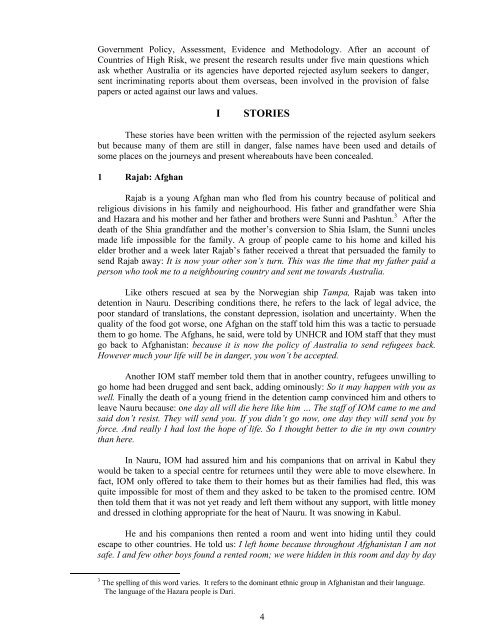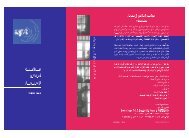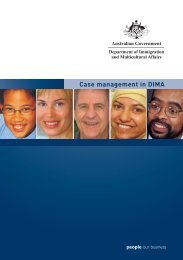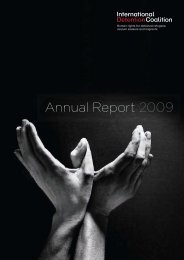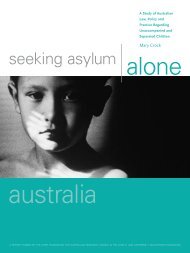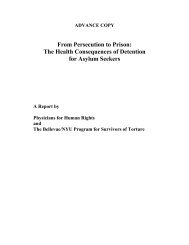DEPORTED TO DANGER - Edmund Rice Centre
DEPORTED TO DANGER - Edmund Rice Centre
DEPORTED TO DANGER - Edmund Rice Centre
Create successful ePaper yourself
Turn your PDF publications into a flip-book with our unique Google optimized e-Paper software.
Government Policy, Assessment, Evidence and Methodology. After an account ofCountries of High Risk, we present the research results under five main questions whichask whether Australia or its agencies have deported rejected asylum seekers to danger,sent incriminating reports about them overseas, been involved in the provision of falsepapers or acted against our laws and values.IS<strong>TO</strong>RIESThese stories have been written with the permission of the rejected asylum seekersbut because many of them are still in danger, false names have been used and details ofsome places on the journeys and present whereabouts have been concealed.1 Rajab: AfghanRajab is a young Afghan man who fled from his country because of political andreligious divisions in his family and neighourhood. His father and grandfather were Shiaand Hazara and his mother and her father and brothers were Sunni and Pashtun. 3 After thedeath of the Shia grandfather and the mother’s conversion to Shia Islam, the Sunni unclesmade life impossible for the family. A group of people came to his home and killed hiselder brother and a week later Rajab’s father received a threat that persuaded the family tosend Rajab away: It is now your other son’s turn. This was the time that my father paid aperson who took me to a neighbouring country and sent me towards Australia.Like others rescued at sea by the Norwegian ship Tampa, Rajab was taken intodetention in Nauru. Describing conditions there, he refers to the lack of legal advice, thepoor standard of translations, the constant depression, isolation and uncertainty. When thequality of the food got worse, one Afghan on the staff told him this was a tactic to persuadethem to go home. The Afghans, he said, were told by UNHCR and IOM staff that they mustgo back to Afghanistan: because it is now the policy of Australia to send refugees back.However much your life will be in danger, you won’t be accepted.Another IOM staff member told them that in another country, refugees unwilling togo home had been drugged and sent back, adding ominously: So it may happen with you aswell. Finally the death of a young friend in the detention camp convinced him and others toleave Nauru because: one day all will die here like him … The staff of IOM came to me andsaid don’t resist. They will send you. If you didn’t go now, one day they will send you byforce. And really I had lost the hope of life. So I thought better to die in my own countrythan here.In Nauru, IOM had assured him and his companions that on arrival in Kabul theywould be taken to a special centre for returnees until they were able to move elsewhere. Infact, IOM only offered to take them to their homes but as their families had fled, this wasquite impossible for most of them and they asked to be taken to the promised centre. IOMthen told them that it was not yet ready and left them without any support, with little moneyand dressed in clothing appropriate for the heat of Nauru. It was snowing in Kabul.He and his companions then rented a room and went into hiding until they couldescape to other countries. He told us: I left home because throughout Afghanistan I am notsafe. I and few other boys found a rented room; we were hidden in this room and day by day3 The spelling of this word varies. It refers to the dominant ethnic group in Afghanistan and their language.The language of the Hazara people is Dari.4


